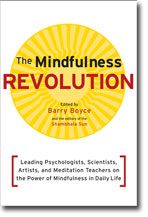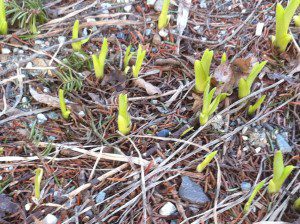There is talk about a revolution, a “mindfulness revolution.” And the evidence for this revolution is mounting and coming from many corners of the world. My “Dictionary” app on my iPhone offers multiple definitions of revolution:
- An overthrow or repudiation and the thorough replacement of an established government of political system by the people governed.
- A radical and pervasive change in society and the social structures, especially one made suddenly and often accompanied by violence.
- A sudden, complete or marked change in something
- A procedure or course, as it in a circuit back to a starting point
- a single turn of this kind
- Mechanical, astronomical, and geological definitions based on the turning aspect of revolution are also mentioned.
 If we replace the political system with an ideology for approaching life, mindfulness just may qualify as revolutionary. The established government is ignorance, living our lives on automatic pilot, asleep to the rich sensory world around us, lost in stories. When we become mindful we overthrow that ignorance, if just for a moment, to embrace what is happening now. So, this aspect of the mindfulness revolution is personal.
If we replace the political system with an ideology for approaching life, mindfulness just may qualify as revolutionary. The established government is ignorance, living our lives on automatic pilot, asleep to the rich sensory world around us, lost in stories. When we become mindful we overthrow that ignorance, if just for a moment, to embrace what is happening now. So, this aspect of the mindfulness revolution is personal.
Barry Boyce and the contributing authors to the edited volume. The Mindfulness Revolution, also have the second definition in mind, with the exception of the violence piece. All of us teaching and writing in the mindfulness community would like to see mindfulness come off the cushion and out of the benefit for individuals to see changes in our very society and social structures. Imagine if our political and corporate leaders practiced mindfulness. The world might be a different place.
Of course, mindfulness is also a revolution in the circuit sense. We come back to now. We wheel out into the fantasy and we return to here. We fall asleep and we wake up. We make these revolutions countless times per day. Albeit these are not predictable turns like the earth making a revolution around the sun, but they occur nonetheless.
In The Mindfulness Revolution,
You will hear from many people, including many of the most authoritative voices in the world of mindfulness. They will take you on a mindfulness journey, beginning with personal instruction, then discussing various ways that practice may be useful in your life, and ending with a short survey of ways that mindfulness practices are starting to make inroads into key sectors of society.
The revolution started in its most recent incarnation with Jon Kabat-Zinn when he had the flash of insight to bring mindfulness meditation off the cushion of formal Buddhist practice to patients at the University of Massachusetts Medical Center (of course the Buddha had his own revolution 2500 years ago). Thirty some years later, there are 500 hospital programs worldwide taught by teachers certified by the Center for Mindfulness, Healthcare, and Society, more than 9000 teachers, including myself, have been trained there, and more than 18,000 people have taken the mindfulness-based stress reduction (MBSR) programs offered in Worcester. The numbers worldwide are hard to tabulate since MBSR is not a franchise, but they are legion and growing.
Additionally and importantly, Jon started doing research right away and we see an exponential increase in the number of research studies validating the benefits of mindfulness-based practices. For example, there are ten different agencies with the National Institute of Health that are funding mindfulness studies.
Writing this blog is part of my role in bringing about the revolution. You, my dear reader, are empowered to bring the benefits of mindfulness to yourself and those around you. To further the revolution, I am in the process of writing a manifesto, because any good revolution needs a manifesto. There are ten points to the manifesto; a curriculum for waking up, if you will and I’ll be presenting these here over the next few weeks.
Stay tuned and keep turning.

